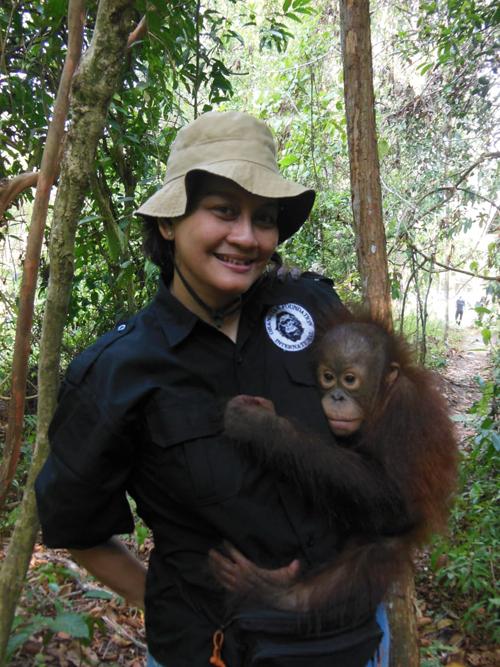
Jakarta, the current capital of Indonesia. A city famed for its hustle and bustle, roads jam packed with motorbikes and cars each vying for space, sidewalks overflowing with street vendors and people. It’s easy to be overwhelmed here. In amongst this sits an unassuming side street where one will find an equally unassuming house. Finding it can require a master’s degree as these back streets twist and turn ensuring those unfamiliar with the area will have a hard time finding any address. The only clues as to the house occupants are a couple of Orangutan Foundation International (OFI) logos which cling snugly to a lower front window. This is the OFI Jakarta office. It is a conduit for all those wishing to get involved and also acts a stop off for those on their way to Borneo. Here you will find Ibu Renie hard at work at her computer. Ibu Renie Djojoasmoro is a resident of Jakarta and works out of the office but she is not deskbound by any means.
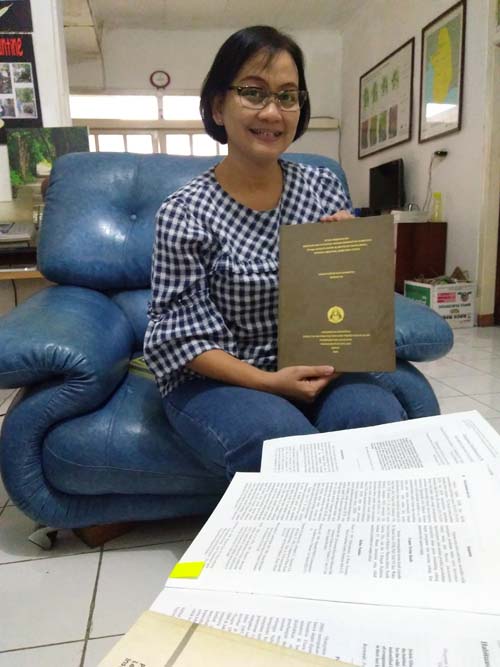
Ibu Renie has a distinguished academic background. Studying at the Universitas National Biologi in Jakarta she had the choice between botany and zoology. Primates proved to be her calling and soon enough she was looking for a research project on orangutans. Since the University had links with Tanjung Puting National Park in Central Kalimantan (Indonesian Borneo) it seemed inevitable she would come into contact with OFI. She worked up a proposal to study parasites in wild and ex-captive orangutans and brought this to Dr. Galdikas. This led to Ibu Renie spending the better part of 1994-1995 at the Camp Leakey research site in Tanjung Puting. She was Dr.Galdikas’ first Indonesian female field student although many Indonesian male students had preceded her. She had to habituate to life in the forest as the camp lacks many creature comforts but she took to it easily. Washing in the river was the normal thing at the time and Ibu Renie enjoyed going for a swim. These days there are many more crocodiles in the river and she probably wouldn’t do it now! In fact, two people were killed by crocodiles in the Sekonyer River after she left.
Ibu Renie would follow wild orangutans around the forest collecting fecal samples. As she sits with her impressive printed and bound papers she remarks that the ex-captive orangutans were much easier to collect samples from but she was never put off for a second from following wild orangutans. She has fond memories of a wild orangutan infant named Morton. She would follow this infant and his mother far into the forest. Watching him helped her to understand the behavior of orangutans. Ibu Renie laughs as she recalls a time Morton watched her from up atop his tree and shook a branch playfully at her. It took her by surprise but remains a cherished memory.
Her research at an end, Ibu Renie continued working with other organizations before being employed as a Manager at Orangutan Care Center and Quarantine (OCCQ) from 1998-2000 when she was based in Kalimantan. Her academic career wasn’t over as she went on to do a Master’s degree at the University of Indonesia. She stuck with orangutans and this time journeyed to North Sumatra to study the orangutans of Tapanuli. She was actually one of the first investigators to research the wild orangutans of Tapanuli. She remembers how their hair color was quite unlike the Bornean orangutans. She also found the ecology different. These orangutans seemed much more sociable then their wild Bornean counterparts. By 2004 she had completed her Master’s degree and had the opportunity to see other primates in the world. Accompanying Dr. Galdikas, Ibu Renie visited Uganda and Rwanda to observe chimpanzees and mountain gorillas, indeed a dream come true, as well as baboons and vervet monkeys in South Africa and other African countries. Following this in 2005 she began work at the OFI office in Jakarta as its director. There is a small but dedicated team at the office as Ibu Renie works alongside Pak Yandi and Ibu Astried. Now people come to Ibu Renie to make proposals.
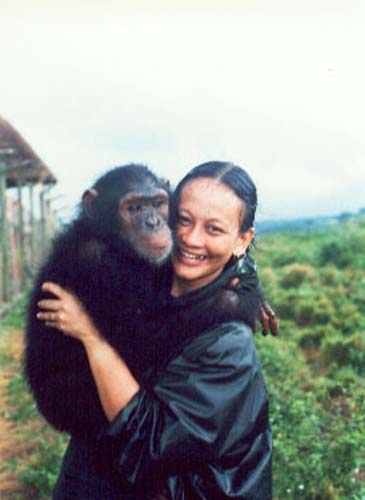
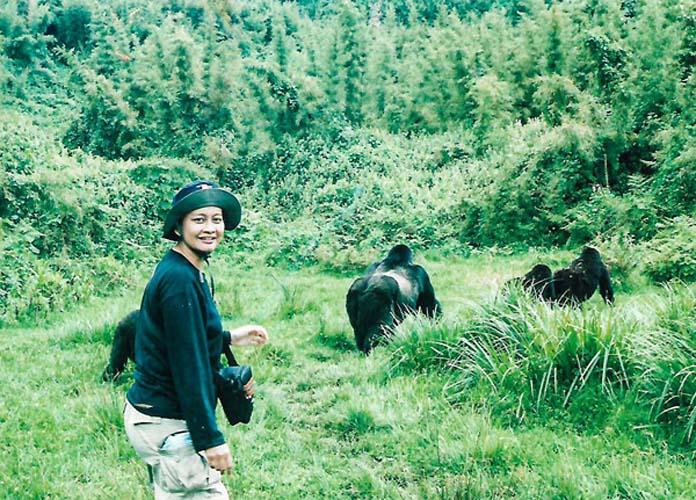
Ibu Renie often acts as a liaison between OFI and the Indonesian Government. She helped facilitate the translocations of orangutans such as Mamat and later, two Bornean male orangutans, Jacko and Jono, who were both rescued in Jakarta and returned home to Borneo. The bureaucracy can sometimes be a headache but successes such as the repatriation of 4 female orangutans from Thailand to Indonesia make it worthwhile. In Bangkok, Thailand these females had been abused and exploited, dressed up and made to hold up signs during “boxing matches” between male orangutans. Because of this, these females were known as the “Bangkok Bikini Babes.” There were originally 5 orangutans but, unfortunately, the one male died before the five orangutans could be returned to Indonesia. The remaining 4 are now home in a safe and nurturing environment. They no longer have to worry anymore.
Ibu Renie accompanies Dr. Galdikas to meetings in Jakarta and aids with events such as a talk at the British Embassy and talks to local Indonesian businesspeople and managers. Here Ibu Renie gets to meet people from all different walks of life. Getting invited to the British Embassy Christmas party is a nice way to mix business and pleasure. Giving a talk for the Mexican Ambassador with a reception afterwards some years ago was similar. One Thanksgiving was celebrated at the U.S. Ambassador’s residence with his family and other guests. He had visited Tanjung Puting as had his family and was entranced with his orangutan and forest experience.
Another important part of Ibu Renie’s job that she enjoys enormously is education. She reaches out to elementary schools in Jakarta and if the schools are interested they invite OFI to talk to the children. Ibu Renie recalls that over the years there were many ways to engage these kids with coloring activities and even firsthand experience of how to be an orangutan. A fun and memorable way for them to learn about nest building was to let them have a go themselves complete with leaves and branches! These messages about saving orangutans and their habitat help the children of the next generation understand the natural world and help them want to participate in preserving it. Recently Ibu Renie was joined by Ibu Irma who now gives talks on social media as Covid has curtailed school visits.
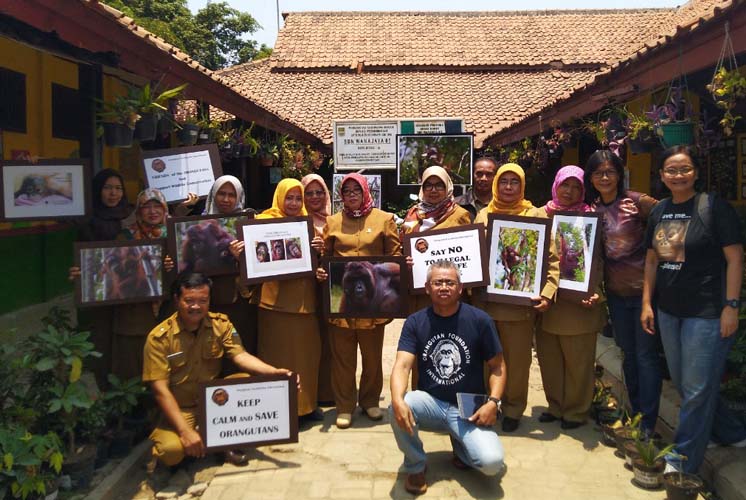
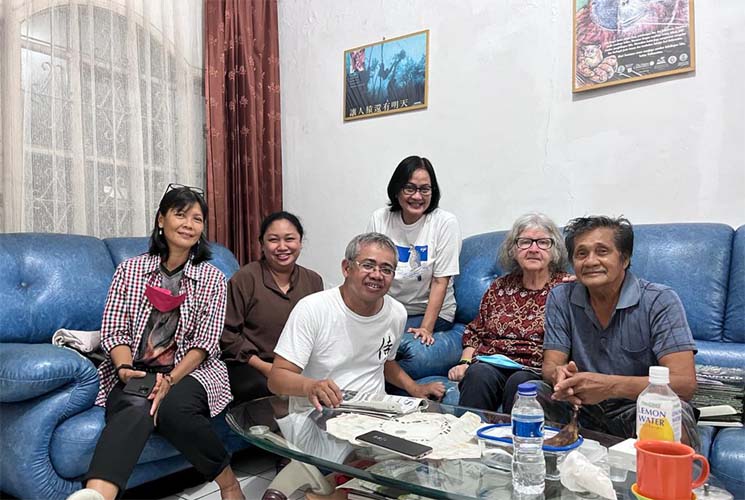
Ibu Renie writes about her own experiences in OFI’s Indonesian newsletter magazine “Pesan Dari Alam” (“Message from Nature”). A favorite article is one she penned about the Lamandau region in Central Borneo, home to many Bornean orangutans. Ibu Renie accompanied a government survey team some years ago when through Dr. Galdikas and OFI’s hard work as well as her own, this area was officially designated a Wildlife Reserve by the Indonesian government.
Ibu Renie still often gets to Camp Leakey. If there are any Government officials from Jakarta wanting to visit she helps organize and escort them. She loves visiting during the fruiting season so she can try all the different forest fruits not readily available in Jakarta. One day she also hopes to visit Sumatra again. She says, “My dream of becoming a primatologist came true.”
“You must follow the wild orangutans,” is something Dr Galdikas told Ibu Renie a long time ago when she got her first degree and she has never forgotten and never stopped “following” orangutans both wild and rescued. All these years Ibu Renie has kept her primate dream alive!
Ibu Renie: A true hero for the primates!


